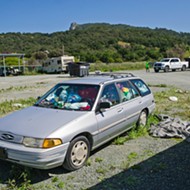Uphill battle: With 11 active lawsuits, Friends of Oceano Dunes fights for the right to play on the dunes
By Samantha Herrera[{
"name": "Newsletter Promo",
"id": "NewsletterPromo",
"class": "inlineCenter",
"insertPoint": "4",
"component": "15264767",
"requiredCountToDisplay": "0"
},{
"name": "Ad - Medium Rectangle CC01 - 300x250",
"id": "AdMediumRectangleCC01300x250",
"class": "inlineCenter",
"insertPoint": "8",
"component": "2963441",
"requiredCountToDisplay": "12"
},{
"name": "Ad - Medium Rectangle LC01 - 300x250",
"id": "AdMediumRectangleCC01300x250",
"class": "inlineCenter",
"insertPoint": "18",
"component": "2963441",
"requiredCountToDisplay": "22"
},{
"name": "Ad - Medium Rectangle LC09 - 300x250",
"id": "AdMediumRectangleLC09300x250",
"class": "inlineCenter",
"insertPoint": "28",
"component": "3252660",
"requiredCountToDisplay": "32"
}]
Over the past 23 years, Friends of Oceano Dunes has filed dozens of lawsuits against various agencies and local governments to continue its mission of protecting camping, recreation, and beach driving.
The group currently has 11 active lawsuits against organizations such as the California Coastal Commission, the San Luis Obispo County Air Pollution Control District, the SLO County Board of Supervisors, and local cities including Grover Beach. Friends of Oceano Dunes President and Founder Jim Suty told New Times that these continued lawsuits are important to maximize public access.
"Some [lawsuits] rely on others to be finished before the other ones can be moved. Right now, we had a huge victory against the Coastal Commission and now they've appealed that decision," he said. "So now, we are working through that appeal, then our cross-appeal because even though we had a victory, the judge went against us in a couple of things that we argued."
On July 19, 2021, Friends of Oceano Dunes brought three lawsuits against the California Coastal Commission's March 2021 decision to phase out off-roading permanently in the Oceano Dunes State Vehicular Recreation Area.
The court determined that the Coastal Commission acted beyond its powers by deciding to permanently stop off-roading in all parts of the Oceano Dunes state park without considering the changes required to the current local coastal program.
That local coastal program is a documented planning tool that helped outline development in coastal zones. The Coastal Commission reviews all coastal programs after either city councils or the local county board of supervisors adopts them. The court said that under the Coastal Act, only the local government can amend its coastal program, according to previous New Times reporting.
"We always believed we had a winning case; we never really doubted it. What we doubted was whether the judge in the legal system would see it correctly. What was neat about this judge is they saw the facts for what it was," Suty said.
"Our other very large lawsuit is what's known as a 'quiet title implied dedication lawsuit,' and that's scheduled to be heard Nov. 4."
Suty explained that since the California Coastal Commission has used implied dedication multiple times for its own benefit, Friends of the Oceano Dunes can do the same thing to restore the use of recreation on the dunes.
Implied dedication is established when the public has used private land for a period of more than five years with full knowledge of the owner, without asking or receiving permission to do so, and without objection being made by anyone, according to the California Land Title Association.
Suty said all of the nonprofit's lawsuits have a common denominator: They target organizations breaking the 1975 General Development Plan.
That plan provides direction and guidance for park purposes, broad land use planning uses, and program-based goals and guidelines. This general plan predates the California Coastal Act, according to California State Parks.
"There was an agreement made many years ago that certain areas would be closed off and certain areas would be left open for camping and off-roading recreation," Suty said. "This was supported by environmentalists and conservationists and off-roaders, but then other groups of environmentalists and conservationists have gone against that and they continue to close more.
"So, if they're not going to honor the agreement, then Friends of Oceano Dunes will work to regain lost lands to make sure that our sport and recreation can continue in the future."
Suty, who lives in San Jose, said things hit a breaking point for him after he attended a February 2001 California Coastal Commission meeting with his dad and saw that commissioners were attempting to change recreation hours at the dunes.
"They don't have the power or the authority to close the park, and when we were driving home, my father and I had discussed what we can do because there's nobody leading the fight, nobody was doing anything," he said. "I reached out to some people to tell them I'm willing to step up and fight the fight. So, Friends of Oceano Dunes was basically born out of that meeting."
Classified as a 501(c)(3) California not-for-profit public benefit corporation, the group has 28,000 members, according to its lawsuit against the San Luis Obispo County Air Pollution Control District, California Department of Parks and Recreation, and the California Off-Highway Motor Vehicle Recreation Commission.
Although Suty said he couldn't tell New Times how much money Friends of Oceano Dunes pours into lawsuits, he added that every dime received goes into regaining access to the dunes.
"Our driving force is raising the money to continue to pay for the lawyers and specialists to fight the fight. We don't live and die by our membership," he said. "One very unique thing about Friends of Oceano Dunes is we pay no salaries, so truly 100 percent of the money raised goes to the fight."
The organization also works to promote the economic revenue that the dunes bring to SLO County.
According to a study by marketing organization Visit SLO CAL and tourism and economic development advisor Resonance, spending by visitors from outside SLO County to the dunes generated a total economic impact of $511.2 million in 2019, according to previous New Times reporting.
"What people fail to recognize is the closure of this park would have a drastic impact on employment, the economic engine of the area," Suty said. "We have supporters worldwide—I mean people who have been here from Germany that want us to keep it open in case they come back. People from Canada, Mexico, all over the United States, people love the beach."
Suty said he would like to see the hostile environment around the dunes end so that everyone can pursue what's best for the community.
"Let's all work to find solutions to the problems. If you're a boater at Lopez Lake or a fisherman off the pier, then let's work together as a populace to try and make sure we have the right behaviors installed," he said. "But we've been excluded from the discussions, so our only recourse has been these lawsuits." Δ
Reach Staff Writer Samantha Herrera at [email protected].
Latest in News
Comments
Showing 1-1 of 1
Readers also liked…
-

Coast Unified teachers upset over new position's salary and qualifications
Oct 20, 2022 -

SLO police identify alleged driver who hit and killed couple
Dec 22, 2022 -

When the levee breaks: Oceano residents, county officials walk a tightrope of regulations to manage Arroyo Grande Creek, which some say led to the levee's failure in January
May 18, 2023









